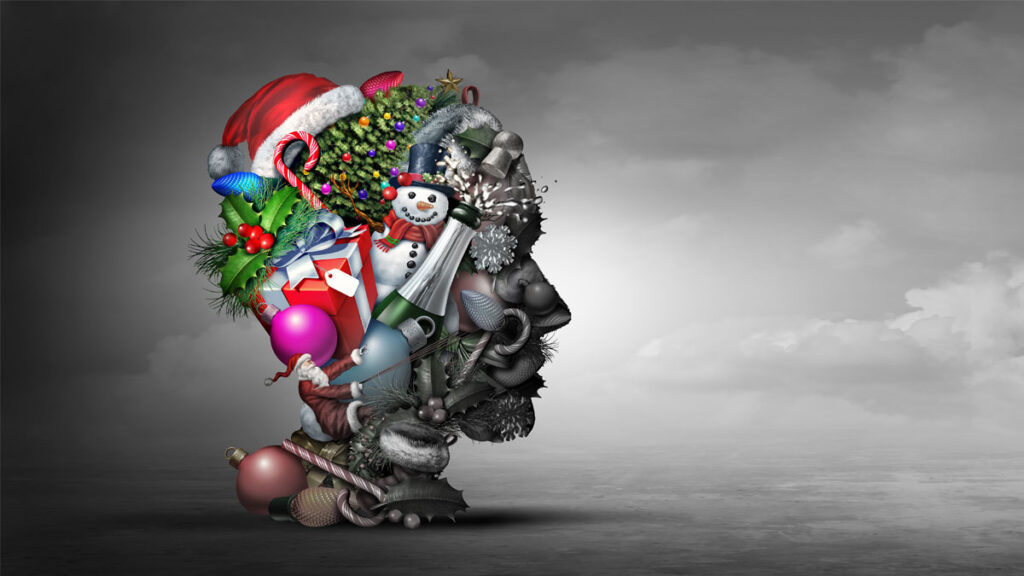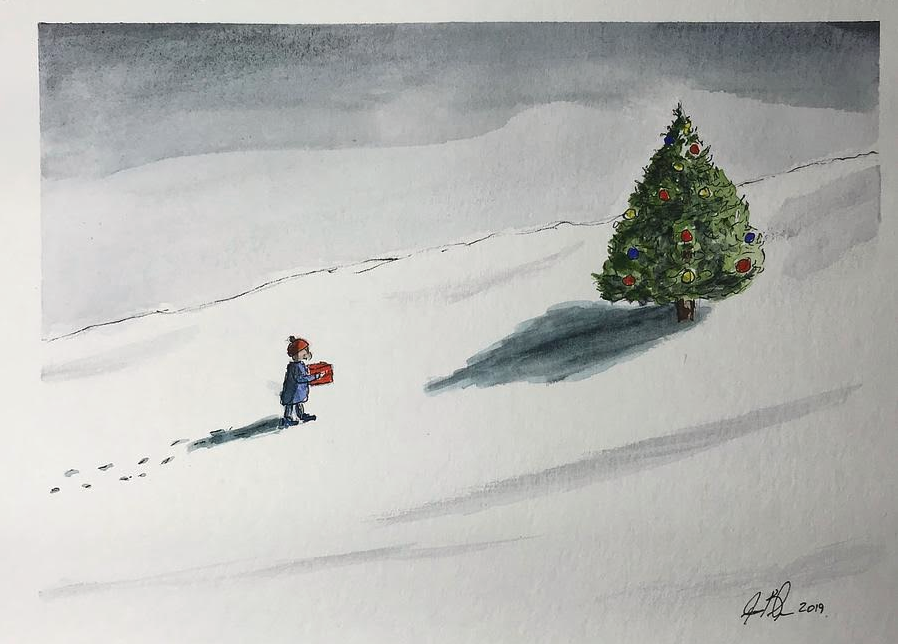By Rania Tsoli,
Christmas may be over, but the most wonderful time of the year is not over yet; and with it, there come blinking lights, shiny gift-wrapping paper, and more candy canes than you can count. Friends are strolling down heavily decorated streets, while window shopping, big families are having gatherings where they exchange presents after polishing delicious food off their plates, children are giggling while playing with the family dog in a snowy park, and couples are walking hand in hand while rushing to find an empty table and shelter from the cold in a busy coffee shop. Christmas is all around; but, to a plethora of people — and perhaps to you, too —, the atmosphere is anything but merry. For some reason, you resonate with the Grinch a bit too much, and you cannot help but feel a bit blue.
Symptoms like this could be a solid indicator of you coming down with what is known as “holiday depression”, or the infamous “holiday blues” to go with your blue mood. Holiday depression is shortly defined as temporary feelings of anxiety or depression during the holiday season, and it is not all that rare; in fact, it is a quite common phenomenon, especially in the modern day. The strongest causes of the holiday blues include stress, fatigue, and financial struggles, as well as unmet expectations and loneliness.
Balancing the demands of shopping, parties, family obligations, and house guests may contribute to feelings of tiredness and increased tension, as well as being overwhelmed and anxious about even the slightest thing. Many people that experience stress-related holiday depression may develop stress responses, such as headaches, excessive drinking, over-eating, and insomnia. In fact, some of the symptoms mentioned above, like excessive drinking and insomnia, can create a vicious cycle of constantly feeling restless due to the lack of sleep and the effect of alcohol on the human organism, therefore, making the feelings of fatigue and uneasiness all the more toilsome.

Besides exhausting, all the planning and shopping that holidays traditionally require can prove to be an addition to a household’s economic burdens. The over-commercialization of the holidays can easily make you compulsively spend money: you feel the need to buy the cutest decorations for your tree and all the ingredients listed in the fanciest food recipes for your parties. Add that to the gifts that you carefully selected for your loved ones, and you got yourself a bit of a financial crisis. To many, this might only be a tiny setback that they can bounce back from almost instantly; to others, though, this can prove to be yet another stressor to an already hectic time of year, leading to – you guessed it – even more stress.
Because holidays signal the start of a new year, you may begin to dwell on the previous months and feel regret or failure; you may think about your objectives and what you hoped to achieve, and become frustrated if all of your expectations have not yet been satisfied. Truth be told, holidays – once again, often because of over-commercialization – are quite pressuring for many of us. As soon as November comes around and we realize that Christmas is just around the corner, we begin to panic: “What about all my New Year’s resolutions?”. Things do not appear to have altered significantly. “Am I doing something wrong?”; the inquiries keep coming, and we are growing increasingly resentful of all the things we promised we would do, but never did.
Sometimes, all this self-reflecting and overthinking can be a result of more alone-time than usual, and spending a good part of the holidays by yourself can often trigger negative thoughts. Many cannot travel home for Christmas, either for financial reasons or because of work; others are naturally lonelier people, and even if they are used to having fewer loved ones than others, it might still feel a bit depressing around holidays; some might not be close to their families emotionally, while elderlies might have to spend Christmas by themselves because their children and grandchildren are far away. The COVID-19 pandemic has definitely added to the already difficult task of families gathering to spend the holidays together when people are trying to stay safe and keep their loved ones – especially older people – safe as well.

As you can tell, the hurdles are many. Thankfully, there are a few remedies that can help alleviate the pain the holiday blues may cause, and pacing yourself is number one. Try to make your tasks more manageable by creating a list and prioritizing the more important activities. Do not take on more responsibilities than you can handle; in fact, let others share some of the holiday tasks that seem to be giving you a hard time. Being realistic about what you can and cannot do is really important, as is having realistic expectations for the holiday season; do not set yourself up for disappointment by comparing today with the days of the past! When times are tough, take some time and treat yourself, whether that is by baking some Christmas cookies, having a relaxing spa day, watching your favorite movie, or catching up with a friend.
Be careful though: do not trick yourself into thinking that excessive drinking and socially isolating yourself is self-care. Drinking too much alcohol can exacerbate negative feelings, so try to have a limit when you are drinking and do not use alcoholic beverages as a way to feel better. At the same time, try to stop refusing to engage in any form of social contact, as it will only make you sadder in the end; trust me. Instead, look for ways that can help you enjoy social connections: make time to contact a long-lost friend or relative, try to reach out and make a new acquaintance, join a local club, or volunteer to help those in need and spread some holiday cheer.
Though holiday blues are typically fleeting, speaking with a mental health professional might be beneficial. A therapist can help identify patterns of negative thinking that contribute to feelings of sadness. After that, you can work together to replace those thoughts with more helpful ones, an approach that is known as cognitive-behavioral therapy. Therapy may also help you improve your stress management, communication, and interpersonal skills, which will benefit you in the short and long run. Keep this in mind, though: if the holiday blues turn into something more serious or if your sadness does not ease after the holidays are over, your symptoms might be a sign of something else, and you might need to explore other treatment options, including psychotherapy and medications.

We have been conditioned to think that the holidays are the most important event of the year; we give Christmas and New Year’s so much thought, that by the end of the holiday period, we end up feeling worn out and downhearted when things do not turn out the way we imagined they would. We have to realize that nothing is meant to be perfect; no matter the strains, there will always be a way to deal with things. Holidays change, just like people change; kids grow older, adults grow wiser, and people will come and go. Do not try to achieve a picture-perfect Christmas and New Year; besides, I always found spontaneous, “in the moment” pictures to be the prettiest.
References
- What Are The Holiday Blues?, verywellmind.com, Available here
- Holiday Depression and Stress, webmd.com, Available here




